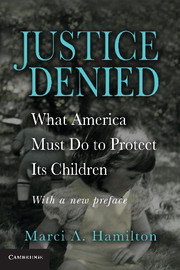Book contents
- Frontmatter
- Contents
- Acknowledgments
- 1 We Have Failed Our Children
- 2 What Is Wrong with the System? The Courthouse Doors Are Closed to Survivors
- 3 The Solution Is Clear and Simple: Abolish the Statutes of Limitation for Childhood Sexual Abuse
- 4 What It Will Take to Protect Children: What the States Must Do; What the Federal Government Should Do
- 5 Barrier #1: The Insurance Industry
- 6 Barrier #2: The Hierarchy of the Roman Catholic Church
- 7 The Other Barriers: Teachers, Defense Attorneys, and an Uninformed Public
- Conclusion: The Coming Civil Rights Movement for Children
- Appendix to Chapter 4
- Appendixes to Chapter 6
- Notes
- Index
Conclusion: The Coming Civil Rights Movement for Children
Published online by Cambridge University Press: 03 May 2010
- Frontmatter
- Contents
- Acknowledgments
- 1 We Have Failed Our Children
- 2 What Is Wrong with the System? The Courthouse Doors Are Closed to Survivors
- 3 The Solution Is Clear and Simple: Abolish the Statutes of Limitation for Childhood Sexual Abuse
- 4 What It Will Take to Protect Children: What the States Must Do; What the Federal Government Should Do
- 5 Barrier #1: The Insurance Industry
- 6 Barrier #2: The Hierarchy of the Roman Catholic Church
- 7 The Other Barriers: Teachers, Defense Attorneys, and an Uninformed Public
- Conclusion: The Coming Civil Rights Movement for Children
- Appendix to Chapter 4
- Appendixes to Chapter 6
- Notes
- Index
Summary
Children, especially child sex abuse victims, are at such an enormous disadvantage in the United States. They have been locked out of the justice system again and again, while we have permitted – consciously or unconsciously – predators to live free from public scrutiny. The simple change of eliminating the statutes of limitations (SOLs) turns that set of relationships upside down, placing the child sex abuse victims in the position of power.
It is sad that children's interests have been such a low priority on both the right and the left. The right has championed “parents' rights,” which would keep the government out of what they consider family business. While individuals can disagree on what amounts to “spanking” or inappropriate discipline, the political right undermines its own “family values” rhetoric if it extends those principles to the child sex abuse sphere.
It is an unfortunate fact that many Republicans to date have resisted SOL reform for child sex abuse victims, in part because Republicans tend to be more beholden to religious interests than others. A shining exception is Rep. Deborah Hudson in Delaware, whose leadership led to unanimous support for SOL reform in the Delaware House.
On the left, the American Civil Liberties Union (ACLU) rarely if ever takes the side of a child (unless it is the right of the child to speak in a public school) and has increasingly taken up the cause of religious organizations.
- Type
- Chapter
- Information
- Justice DeniedWhat America Must Do to Protect its Children, pp. 111 - 116Publisher: Cambridge University PressPrint publication year: 2008



